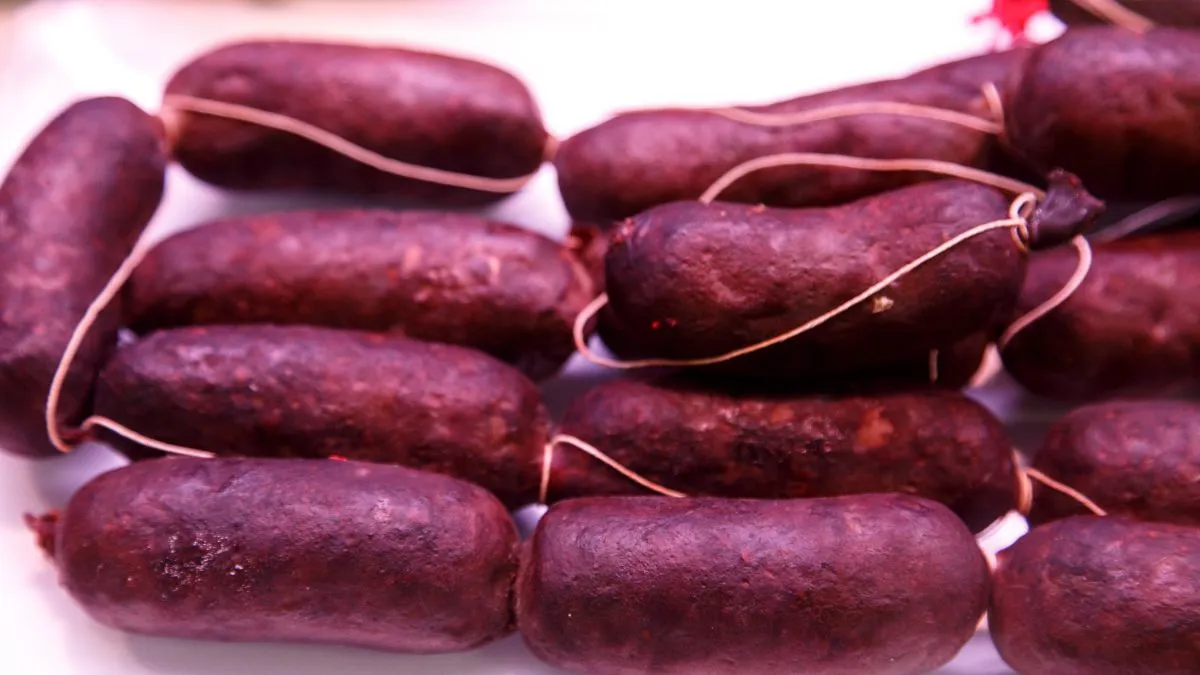Welcome to the savory world of morcilla, the delicious blood sausage that adds depth and richness to a variety of dishes. If you’re a culinary adventurer looking to expand your palate, morcilla is a must-try ingredient that will elevate your cooking to new heights. In this blog post, we’ll explore what morcilla is, how to cook with it, its unique flavor profile compared to chorizo, different varieties available, mouth-watering recipes to try at home, storage tips, and why you simply have to give this Spanish delicacy a taste. Let’s dive in!
Table of Contents
What Is Morcilla?
Morcilla, also known as blood sausage, is a traditional Spanish delicacy that dates back centuries. It is made by combining pork fat, onions, spices, and most notably pig’s blood to create a rich and flavorful sausage. The mixture is then stuffed into natural casings and cooked to perfection.
The result is a dark-hued sausage with a uniquely earthy flavor that sets it apart from other sausages. While the idea of using blood in cooking may seem unconventional to some, this sausage offers a depth of taste that adds complexity to dishes.
Each region in Spain has its own variation of morcilla, with different seasoning blends and textures depending on local traditions. This versatile ingredient can be enjoyed sliced and pan-fried as tapas or incorporated into stews, rice dishes, omelets, or even served alongside crusty bread and cheese for a delightful charcuterie board addition.
How to Cook Morcilla
To cook it, start by gently heating a non-stick pan over medium heat. Remove the morcilla from its casing and slice it into rounds or crumble it for different dishes. Add a small amount of oil to the pan if needed, as morcilla has natural fats that will render while cooking.
Place the slices or crumbled bits in the heated pan, stirring occasionally to ensure even cooking. Cook until they are browned on all sides and heated through; this usually takes about 5-7 minutes depending on thickness.
You can also grill or bake this sausage for a different texture and flavor profile. Grilling imparts a smoky taste while baking can result in crispy edges and soft centers.
This sausage works well in various recipes such as stews, omelets, pasta dishes, or simply served with crusty bread and a glass of red wine for an authentic Spanish experience. Enjoy experimenting with this versatile blood sausage!
What Does Morcilla Taste Like?
Morcilla, also known as blood sausage, offers a unique and distinctive taste that sets it apart from other types of sausages. The flavor profile of morcilla is rich, savory, and robust with a hint of sweetness. When cooked, the texture becomes creamy and smooth, making it a delightful addition to various dishes.
The combination of spices like paprika and cumin infused into the blood gives morcilla its characteristic earthy undertones. The addition of onions or rice provides an extra layer of complexity to the overall taste experience. Some varieties may contain herbs or even fruit for added depth in flavor.
Despite containing blood as a key ingredient, morcilla does not have a strong metallic taste; instead, it boasts a balanced umami flavor that appeals to adventurous food enthusiasts looking to expand their culinary horizons.
Morcilla vs. Chorizo
When it comes to Spanish sausages, Morcilla and Chorizo are two popular choices that offer distinct flavors and textures. Morcilla, also known as blood sausage, is made with pork blood as a key ingredient, giving it a rich and earthy flavor. On the other hand, Chorizo is a spicy sausage typically made with pork seasoned with paprika and garlic.
Morcilla has a darker color due to the blood content while Chorizo usually has a vibrant red hue from the paprika. In terms of taste, Morcilla offers a unique savory richness while Chorizo brings heat from the spices. Both sausages can be enjoyed in various dishes like stews or grilled meats.
Whether you prefer the bold flavors of Morcilla or the spiciness of Chorizo ultimately depends on your personal taste preferences. Experimenting with both types of sausages can add depth and complexity to your culinary creations.
Varieties
When it comes to morcilla, there are various regional varieties that offer unique flavors and textures. In Spain, you can find Morcilla de Burgos made with rice or Morcilla de León with onions and paprika. Argentina boasts its version called Morcilla Dulce which includes walnuts and raisins for a sweet touch.
In Mexico, Moronga is popular, typically spiced with chili peppers. The Portuguese have their own take on blood sausage known as Morcela often seasoned with cinnamon and cloves. Each variety showcases the diverse culinary creativity around incorporating blood sausage into different cuisines.
Whether you prefer a more savory or sweeter taste profile, exploring the different varieties of morcilla allows you to experience a range of flavors that cater to various palates. Next time you’re at your local market or traveling abroad, don’t hesitate to sample these distinctive variations of this beloved blood sausage delicacy.
Morcilla Recipes
Looking for creative ways to incorporate morcilla into your cooking? There are plenty of delicious recipes that showcase the unique flavors of this blood sausage. One popular option is to cook morcilla on the grill or in a pan until crispy, then serve it alongside crusty bread and a tangy apple chutney for a flavorful appetizer.
For a heartier dish, you can try adding crumbled morcilla to a Spanish-style omelette known as tortilla de patatas. The richness of the blood sausage complements the creamy eggs and potatoes perfectly. Another tasty idea is to use morcilla as a stuffing for roasted bell peppers or mushrooms – simply remove the seeds, fill with cooked morcilla mixture, bake until tender, and enjoy!
If you’re feeling adventurous, consider incorporating morcilla into pasta dishes like carbonara or risotto for an unexpected twist. The possibilities are endless when it comes to experimenting with this versatile ingredient in your kitchen.
Storing Morcilla
When it comes to storing morcilla, there are a few key things to keep in mind to ensure its freshness and flavor.
It’s best to store morcilla in the refrigerator. Place it in an airtight container or wrap it tightly in plastic wrap to prevent any odors from affecting its taste.
If you have purchased fresh morcilla but won’t be using it right away, consider freezing it. Make sure to wrap it securely before placing it in the freezer.
For cooked morcilla leftovers, store them in the fridge for up to three days. Remember that reheated morcilla may not retain its original texture as well as when freshly cooked.
Always check the expiration date on commercially packaged morcilla and follow any specific storage instructions provided by the manufacturer.
Proper storage techniques can help prolong the shelf life of your beloved blood sausage delicacy!
Why You Have To Try Morcilla
If you consider yourself an adventurous foodie, then trying morcilla should be at the top of your culinary bucket list. This blood sausage offers a unique flavor profile that is rich, savory, and slightly earthy. Its blend of spices and pork fat creates a distinct taste that sets it apart from other sausages.
Morcilla’s versatility in cooking makes it a must-try ingredient. Whether grilled, fried, baked, or added to stews and soups, this Spanish delicacy can elevate any dish with its bold flavors. It adds depth and complexity to recipes while infusing them with a satisfying umami richness.
By incorporating morcilla into your cooking repertoire, you open up a world of gastronomic possibilities. From traditional Spanish tapas to modern fusion creations, this blood sausage brings a touch of authenticity and innovation to your meals. Explore the delicious ways to enjoy morcilla and expand your palate with this flavorful delicacy.
How to Eat Morcilla
When it comes to enjoying morcilla, there are various delicious ways to incorporate this flavorful blood sausage into your meals. One traditional method is to simply slice the morcilla and pan-fry it until crispy on the outside while maintaining a juicy interior. This cooking technique enhances its rich flavors.
Another popular way to eat morcilla is by adding it as a filling in empanadas or savory pastries. The combination of the hearty sausage with flaky pastry creates a mouthwatering treat that is perfect for snacks or appetizers.
Morcilla can also be crumbled and used as a topping for pizzas or mixed into pasta dishes for an added depth of flavor. Its unique taste profile makes it a versatile ingredient that can elevate various recipes.
Whether you enjoy morcilla on its own, paired with eggs for breakfast, or incorporated into stews and casseroles, there are endless possibilities to savor this delectable blood sausage in your culinary creations.
Related Products
If you enjoy exploring different types of sausages and meats, you may also want to try other related products that offer unique flavors and textures. Veal Sweetbread is a delicacy known for its rich taste and tender consistency, perfect for those who appreciate offal dishes.
For a portable savory treat, consider trying an Organic Beef Empanada. These hand-held pastries are filled with seasoned beef and vegetables, making them a convenient option for on-the-go meals or snacks.
If you’re looking to spice things up, Grass-Fed Skirt Hot Dogs might be your next favorite indulgence. Made from high-quality grass-fed beef, these hot dogs offer a flavorful twist on the classic favorite.
For fans of lamb meat, Merguez Lamb Sausage is a must-try. This North African-inspired sausage is typically spiced with harissa and other aromatic seasonings, adding depth and heat to your dishes.
And if you can’t get enough of Spanish-style sausages like Morcilla, don’t miss out on trying Spanish Style Chorizo. With its smoky flavor profile and versatile uses in recipes ranging from paella to tapas dishes, it’s sure to become a staple in your kitchen lineup.
Veal Sweetbread
Veal sweetbread, despite its name, is not a sugary treat but rather a culinary delicacy. It’s actually the thymus gland of a calf and has a rich, creamy texture when cooked properly.
Often pan-fried or sautéed, veal sweetbread can be enjoyed in various dishes ranging from upscale gourmet cuisine to more rustic comfort food recipes.
Its mild flavor allows it to absorb the flavors of herbs and spices used in cooking, making it versatile for different culinary creations.
While some may find the idea off-putting due to its organ origin, those who appreciate fine dining often seek out veal sweetbread for its unique taste and texture profile.
If you’re feeling adventurous and want to elevate your gastronomic experience, consider trying veal sweetbread prepared by skilled chefs or experiment with cooking it at home for a special occasion.
Org. Beef Empanada
Organic Beef Empanadas are a delightful treat that combines savory flavors with a crispy crust. Made with organic beef, onions, bell peppers, and traditional spices wrapped in flaky pastry dough, these empanadas make for a satisfying snack or meal.
The rich and tender organic beef filling is seasoned to perfection, offering a burst of delicious flavors in every bite. The combination of vegetables adds a hint of sweetness and crunch to balance out the savory meat.
Whether enjoyed as an appetizer at parties or as a quick meal on-the-go, Organic Beef Empanadas are versatile and easy to eat. Their handheld size makes them convenient for any occasion.
For those looking to savor authentic Latin American cuisine with high-quality ingredients, Organic Beef Empanadas are sure to please your taste buds.
Grass Fed Skirt Hot dogs
Looking to add a twist to your traditional hot dog experience? Consider trying Grass Fed Skirt Hot Dogs. These unique hot dogs are made from grass-fed beef, which not only offers a leaner option but also adds a robust and earthy flavor profile.
Grass-fed beef is known for its higher levels of omega-3 fatty acids and antioxidants compared to conventionally raised beef. This makes Grass Fed Skirt Hot Dogs a healthier choice without compromising on taste.
The skirt steak used in these hot dogs provides a rich and meaty texture that sets them apart from regular hot dogs. Whether grilled, pan-seared, or boiled, these hot dogs offer a delicious alternative for those looking to explore new flavors while still enjoying the classic comfort of a hot dog.
Next time you’re planning a BBQ or simply want to elevate your snack game, consider adding Grass Fed Skirt Hot Dogs into the mix for an exciting culinary experience that’s sure to impress your taste buds.
Merguez Lamb Sausage
Merguez Lamb Sausage is a spicy and flavorful sausage originating from North Africa, particularly Morocco. Made with a blend of ground lamb and spices like paprika, cumin, and chili pepper, Merguez offers a unique taste experience that sets it apart from other sausages. The vibrant red color of the sausage comes from the addition of paprika, giving it an appealing visual appeal.
The bold flavors of Merguez make it a versatile ingredient in various dishes. Whether grilled on its own or used as an accompaniment in tagines or couscous dishes, this sausage adds depth and complexity to any recipe. Its spiciness can be adjusted to suit individual preferences by controlling the amount of chili pepper added during preparation.
Merguez Lamb Sausage pairs well with fresh herbs like mint or cilantro, yogurt-based sauces, and crispy bread for a satisfying meal. Its robust flavor profile makes it a favorite choice for those looking to add some heat to their cooking repertoire.
Spanish Style Chorizo
Spanish Style Chorizo is a type of cured sausage originating from Spain, known for its bold flavors and distinctive red color. Made with coarsely chopped pork seasoned with smoked paprika and other spices, Spanish chorizo offers a rich and robust taste that adds depth to various dishes.
This flavorful sausage can be enjoyed sliced thinly as part of a charcuterie board or cooked in stews, paellas, or even grilled for added smokiness. Its versatility makes it a popular ingredient in Spanish cuisine, adding complexity to both traditional recipes and modern fusion dishes.
The vibrant red hue of Spanish chorizo comes from the addition of smoked paprika or “pimentón,” which not only gives it its characteristic color but also infuses it with a unique smoky flavor profile. This distinct seasoning sets Spanish chorizo apart from other types of sausages on the market.
Whether served as tapas alongside cheese and olives or incorporated into hearty main courses like casseroles or pasta dishes, Spanish Style Chorizo brings an undeniable flair to any meal. Its spicy kick and savory notes make it an essential element in creating authentic Spanish-inspired flavors wherever you are.
Conclusion
Morcilla blood sausage is a versatile and flavorful ingredient that can elevate your cooking to new heights. Whether you enjoy it on its own, incorporate it into traditional dishes, or experiment with fusion recipes, morcilla adds a unique depth of flavor that is sure to impress your taste buds.
By understanding what morcilla is, how to cook it, its distinct taste profile compared to chorizo, the varieties available, delicious recipes to try at home, proper storage methods, and why you must give this delicacy a chance in your culinary adventures – you are now equipped with the knowledge needed to make the most out of morcilla in your kitchen.
So next time you’re looking for an exciting ingredient to spice up your meals, don’t hesitate to reach for some morcilla blood sausage. From savory breakfasts to hearty stews and everything in between, morcilla has something special to offer every dish it graces. Embrace the rich flavors and cultural heritage of this beloved Spanish delicacy – your taste buds will thank you!









